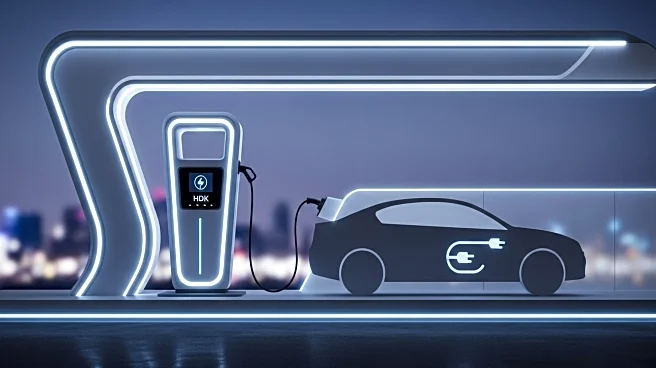What's Happening?
The Internal Revenue Service (IRS) is experiencing delays in approving and paying federal tax credits for electric vehicles, causing confusion among car dealers and hindering EV sales. These delays have been reported by auto dealers and industry analysts, who note that the IRS is taking an unusually long time to process these credits. The tax credits, which can be worth up to $4,000 for used EVs and $7,500 for new EVs, are typically accessed by consumers as an upfront rebate at the point of sale. Dealers front the money to consumers after receiving online approval from the IRS, which then repays the dealers. However, the IRS has not provided an explanation for the delays, leaving dealers uncertain about when or if they will receive the funds. A White House official assured that all valid EV tax credits applied for before the September 30 deadline would be granted and paid out.
Why It's Important?
The delays in processing EV tax credits are significant as they impact the sales of electric vehicles, which are crucial for reducing carbon emissions and promoting sustainable transportation. The uncertainty caused by these delays may deter consumers from purchasing EVs, potentially affecting the growth of the EV market. Car dealers are facing financial strain as they continue to offer the tax credit upfront, risking cash flow issues. The situation is exacerbated by the impending expiration of the tax credit, which was initially set to last until 2032 but is now ending on September 30. This has led to a rush in EV purchases, further complicating the situation for dealers who are unable to float large sums of cash to consumers.
What's Next?
Dealers and industry groups are engaging with the IRS to resolve the issue, hoping for payments to be processed before the program's expiration. The National Independent Automobile Dealers Association and the National Automobile Dealers Association are working with the IRS and the Department of Treasury to address the delays. If the IRS does not resolve the issue promptly, dealers may have to reconsider offering the tax credit upfront, which could impact consumer purchasing decisions and the overall EV market.
Beyond the Headlines
The delays in EV tax credits highlight potential systemic issues within the IRS, such as staffing shortages and increased workload due to higher EV sales. There is speculation that the delays could be a strategic move by the Trump administration to reduce EV sales, although this remains unconfirmed. The situation underscores the importance of efficient government processes in supporting industry growth and consumer incentives.










